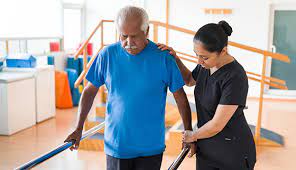Neurological disorders are generally thought to affect older people. However, it can also affect young people. A neuro physiotherapist can help treat conditions that cause impairment of function or movement. Disorders of the nervous system, spinal cord, or brain cause these diseases. Neuro physiotherapy is a type of rehabilitation that studies and treats physical problems caused by neurological disorders in humans.
What Is Neuro physiotherapy?
Neurological physiotherapy is a specialty of physiotherapy aimed at improving movement in patients whose disability is caused by neurological disease or injury. Neurological disorders affect the function of the brain, spinal cord, and nerves.
Multiple sclerosis, stroke, Parkinson's disease, Bell's palsy, etc., are common conditions that cause tremors, paralysis, movement disorders, convulsions, and sensory loss. When the central nervous system is traumatized or damaged, various pathways that carry nerve signals to and from organs and muscles can be disrupted, resulting in the symptoms above.
Neuro physiotherapy helps rehabilitate patients with physical problems caused by neurological disorders. It is intended to slow the pace of decline, maximize an individual's physical potential in terms of flexibility and range of motion, and help children with disabilities achieve developmental milestones.
Principles Of Neurological Physiotherapy
Neurological physiotherapy is based on a number of rehabilitation principles.
- The brain is dynamic and can adapt to changes following brain or spinal cord injury.
- Apply a problem-solving and eclectic approach and tailor treatment to the patient's level of symptoms/injury
- Encourage and build every movement possible. Reinforcement, sensory stimulation, positive reinforcement, verbal feedback.
- Promotes normal movement and function
- Correction and alteration of positioning and posture when lying, sitting, and standing
- Encourage functional activities related to daily work
- Use verbal and visual prompts to encourage patients to think about the task and learn from the treatment
- Prevents muscle shortening that leads to spasticity and movement disorders.
- Using a team approach to patient rehabilitation
Benefits Of Neurological Physiotherapy
Physiotherapy for neurorehabilitation aims to stimulate the nervous system through exercise and therapeutic activities to help patients learn new uses and movements of their muscles. Treatment is usually tailored to each patient's individual needs.
Benefits of neuro physiotherapy include:
-
Strength Up
Strengthening exercises that target weakened muscles affected by injury or condition are used to achieve muscle strength. If the patient can improve muscle control and increase range of motion. It may also be able to handle continuous muscle contraction better.
-
Increased Stamina
With proper training and strategies, patients can begin walking independently on different surfaces for different activities. Mobility aids are often included to aid an individual's posture, balance, and mobility. Physiotherapy treatment often includes training the patient in proper techniques for using mobility aids.
-
Improved balance
Balance training is provided to improve the patient's confidence and stability and to aid in walking and participation in daily activities. People with excellent or improved balance are less likely to fall and injure themselves.
Conditions That Require Neurological Physiotherapy
#1 Microcephaly
Microcephaly causes developmental delay. It occurs before and after childbirth, but the leading cause is an abnormal growth of the brain. This condition causes the baby's head to be smaller than other children of the same age and gender.
#2 Post-polio Syndrome
It is a viral infection that affects the nervous system, and symptoms appear 15 to 30 years after an acute attack of paralysis. Typical symptoms are sudden fatigue, pain, and limited muscle function.
#3 Guillain-Barré Syndrome
Muscles can suddenly become weak when the immune system damages the peripheral nervous system. Weakness and tingling in the extremities are usually typical symptoms.
#4 Stroke
Stroke restricts blood flow to the brain and causes brain cell death. Symptoms arise from the part of the brain that is damaged. Difficulty speaking, numbness or numbness in the face or limbs, and difficulty walking are typical symptoms of a stroke.
#5 Traumatic Brain Injury (TBI)
This condition manifests as abnormal brain function due to sudden trauma to the head, such as a direct blow or collision to the head or body. Symptoms are categorized as mild, moderate, or severe, depending on the location of the head injury.
#6 Parkinson's Disease
It is a degenerative brain disorder caused by the loss of nerve cells containing dopamine, causing movement abnormalities such as tremors, slowed movements, slurred speech, and muscle stiffness.
#7 Alzheimer's Disease
It is a condition that causes the degeneration of brain cells and leads to dementia. Alzheimer's disease manifests as loss of memory, thinking, cognitive and behavioural abilities.
#8 Spinal Cord Injury
The spinal cord connects the brain to the rest of the body through a complex nervous system. When the spinal cord is injured, damage to the discs, ligaments, or vertebrae interferes with how nerves communicate with the body. Spinal cord injury patients lose function below the injury site. Trouble breathing, weakness, poor bladder and bowel control, and numbness are the main symptoms of this condition.
#9 Multiple Sclerosis (MS)
The body's immune system attacks the nervous system by destroying the nerve's protective covering called myelin. Symptoms vary from person to person, depending on which nerve is damaged.
#10 Cerebral Palsy
It is a set of disorders with severe motor impairment and inability to move properly and maintain posture and balance. It can be seen from childhood. They are unable to exercise muscle control due to abnormal brain development or damage to the developing brain.
Conclusion
For extra statistics approximately physiotherapy in Edmonton, AB, or to book an assessment- go to Stride Sports & Physiotherapy at your earliest convenience. They have a well-confirmed technique to supply quicker relief. Go and get the treatment now.


No comments yet